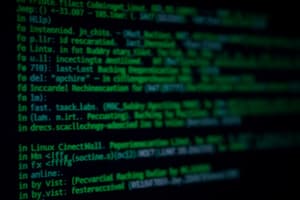Podcast
Questions and Answers
Who is credited with creating the Linux operating system?
Who is credited with creating the Linux operating system?
- Dennis Ritchie
- Linus Torvalds (correct)
- Steve Jobs
- Bill Gates
In which of the following areas is Linux commonly used?
In which of the following areas is Linux commonly used?
- Servers, development, and cybersecurity (correct)
- Desktop publishing only
- Word processing only
- Gaming consoles only
Which of the following is a characteristic that contributes to the popularity of Linux?
Which of the following is a characteristic that contributes to the popularity of Linux?
- Flexibility, speed, and strong community support (correct)
- Exclusively proprietary licensing
- Closed source code
- Limited community support
What is a primary advantage of Linux being open source?
What is a primary advantage of Linux being open source?
Approximately what percentage of web servers are powered by Linux?
Approximately what percentage of web servers are powered by Linux?
How does the performance and speed of Linux compare to Windows?
How does the performance and speed of Linux compare to Windows?
Why is Linux considered developer-friendly?
Why is Linux considered developer-friendly?
What distinguishes the Linux directory structure from that of Windows?
What distinguishes the Linux directory structure from that of Windows?
Which directory in Linux is designated for essential user command binaries?
Which directory in Linux is designated for essential user command binaries?
In Linux, what is the purpose of the /home directory?
In Linux, what is the purpose of the /home directory?
What type of files are typically stored in the /var directory in Linux?
What type of files are typically stored in the /var directory in Linux?
Which Linux command is used to execute commands with administrative privileges?
Which Linux command is used to execute commands with administrative privileges?
What does the pwd command do in Linux?
What does the pwd command do in Linux?
Which command would you use to view the files and directories in your current location within the Linux terminal?
Which command would you use to view the files and directories in your current location within the Linux terminal?
What is the function of the cd command in Linux?
What is the function of the cd command in Linux?
In Linux file permissions, what does 'r' signify?
In Linux file permissions, what does 'r' signify?
What does the permission 'w' allow a user to do in Linux?
What does the permission 'w' allow a user to do in Linux?
What is the purpose of the 'x' permission in Linux file permissions?
What is the purpose of the 'x' permission in Linux file permissions?
Which command is used to change file permissions in Linux?
Which command is used to change file permissions in Linux?
What command is used to change the owner of a file in Linux?
What command is used to change the owner of a file in Linux?
Flashcards
Linux
Linux
An open-source operating system created by Linus Torvalds, widely used in servers, development, and cybersecurity.
Open Source & Free
Open Source & Free
Linux is free to use, and its source code is open for modification
Widely Used (Linux)
Widely Used (Linux)
85% of web servers run on Linux, supports over 1600 mainstream games.
Performance & Speed (Linux)
Performance & Speed (Linux)
Signup and view all the flashcards
Developer Friendly (Linux)
Developer Friendly (Linux)
Signup and view all the flashcards
Root Directory (/)
Root Directory (/)
Signup and view all the flashcards
/bin
/bin
Signup and view all the flashcards
/home
/home
Signup and view all the flashcards
/etc
/etc
Signup and view all the flashcards
/var
/var
Signup and view all the flashcards
/dev
/dev
Signup and view all the flashcards
/proc
/proc
Signup and view all the flashcards
sudo
sudo
Signup and view all the flashcards
pwd
pwd
Signup and view all the flashcards
ls
ls
Signup and view all the flashcards
cd
cd
Signup and view all the flashcards
Read (r)
Read (r)
Signup and view all the flashcards
Write (w)
Write (w)
Signup and view all the flashcards
Execute (x)
Execute (x)
Signup and view all the flashcards
chmod
chmod
Signup and view all the flashcards
Study Notes
- Linux is an open-source operating system created by Linus Torvalds.
- Linux is widely used in servers, development, and cybersecurity.
- Linux is known for flexibility, speed, and strong community support.
Why Linux is Popular
- Linux is free to use, and its source code is open for modification
- 85% of web servers run on Linux.
- Linux supports over 1600 mainstream games.
- Linux is faster than Windows with efficient updates.
- It features a powerful terminal and libraries that are designed for Linux environments.
Linux Structure
- Linux uses a single root directory, unlike Windows.
- /bin: Essential user command binaries.
- /home: User home directories.
- /etc: Host-specific system configuration.
- /var: Variable files like logs.
- /dev: Device files.
- /proc: Virtual filesystem for kernel and process status.
Core Commands
- sudo: SuperUser DO, used to execute commands with administrative privileges.
- pwd: Print Working Directory, shows the current directory path.
- ls: List files and directories.
- cd: Change directory.
Linux File Permissions
- Read (r): View file content.
- Write (w): Modify file content.
- Execute (x): Run a file as a program.
- Owner: The user who owns the file.
- Group: Users in the file's group.
- Others: All other users.
Changing Permissions with chmod
- chmod is used to change file permissions.
- Symbolic Mode: chmod u=rwx,g=rx,o=r file.txt
- Octal Mode: 7 = Read (4) + Write (2) + Execute (1)
- chmod 755 file.txt sets permissions for Owner: rwx, Group: r-x, Others: r-x.
- chmod 777 script.sh makes a file fully accessible to everyone.
File Ownership with chown
- chown is used to change file owner and group.
- sudo chown user:group file.txt command changes both owner and group.
- sudo chown root file.txt command changes owner to root.
- sudo chown :admin file.txt command changes group to admin.
Managing User Password
- passwd is used to change the user's password.
- sudo passwd username is used to change another user's password.
Network Commands
- ip a displays IP addresses.
- ifconfig shows network configuration (older command).
- ifconfig is useful for troubleshooting network issues.
Practical Tasks
- Task 1: Learn Vim through Vim Adventures.
- Task 2: OverTheWire's Bandit reach level 10 and Leviathan reach 5.
- Task 3: Complete 50 challenges in Terminus.
Studying That Suits You
Use AI to generate personalized quizzes and flashcards to suit your learning preferences.




